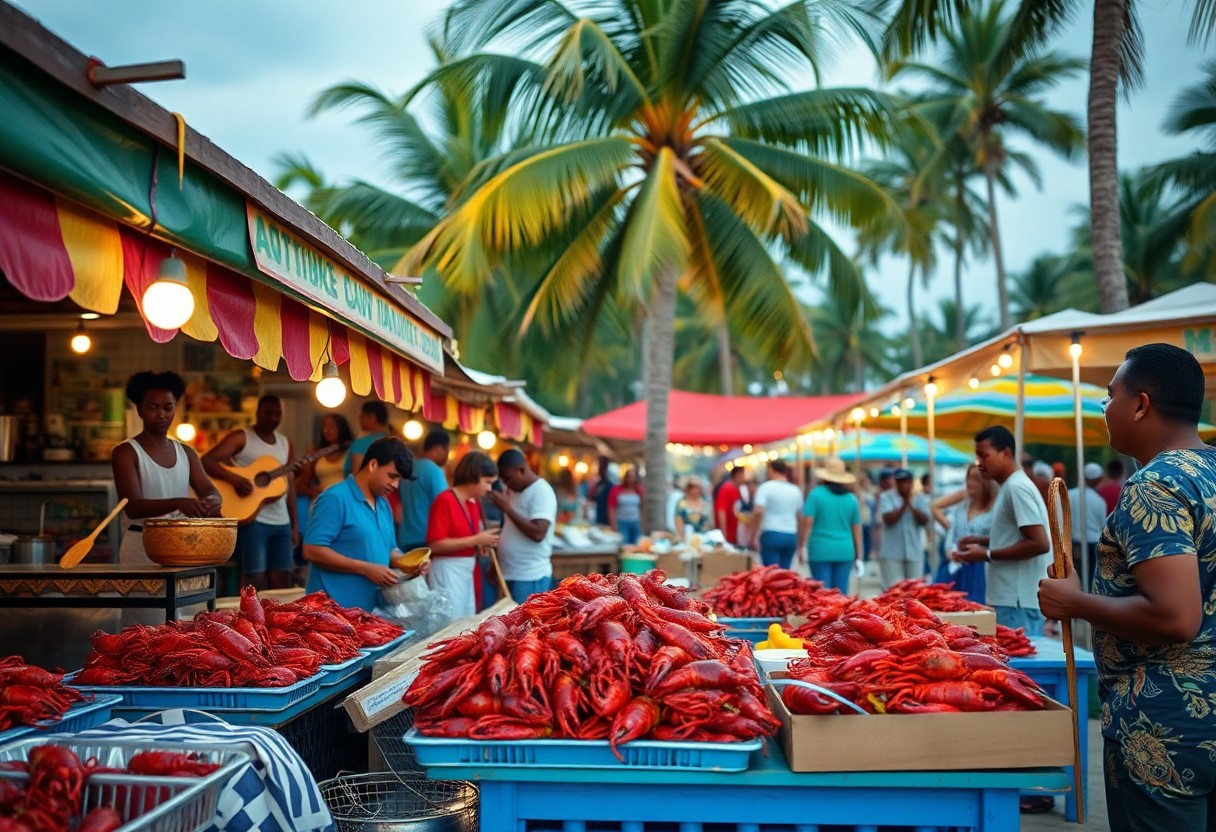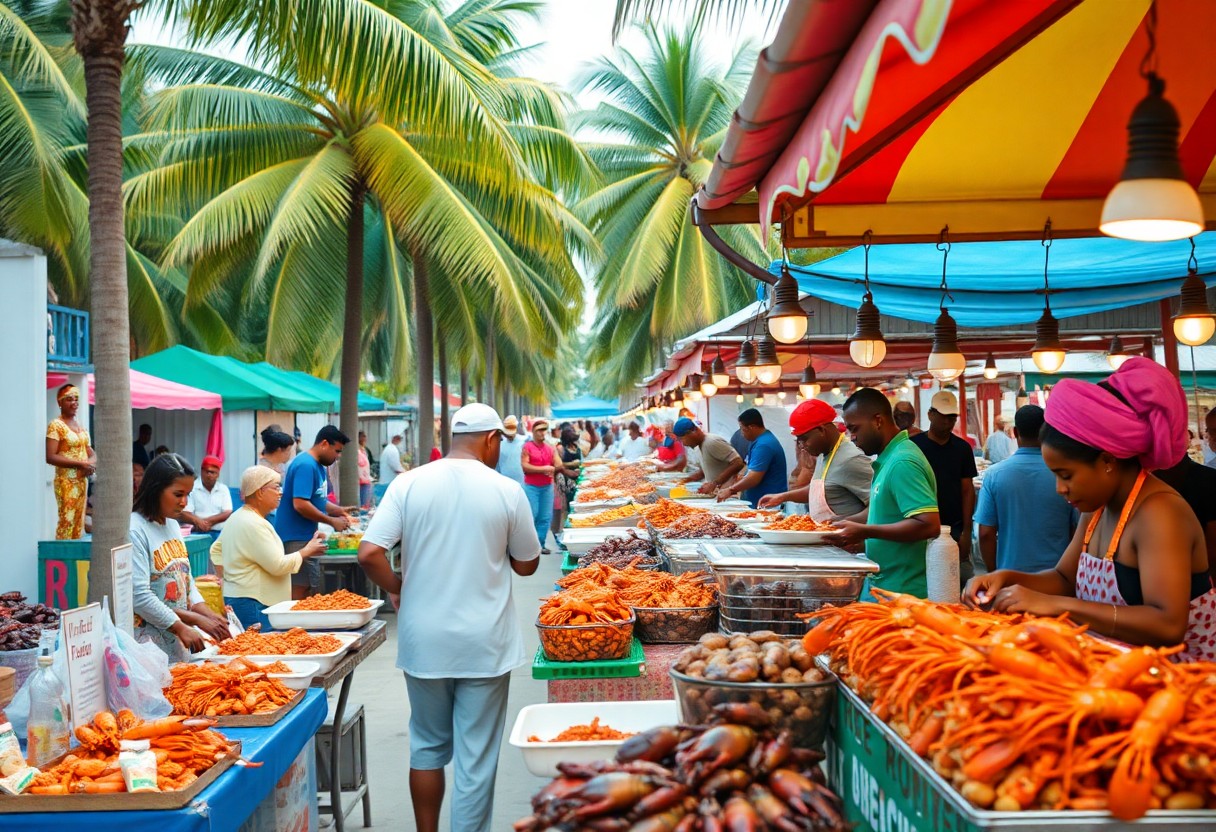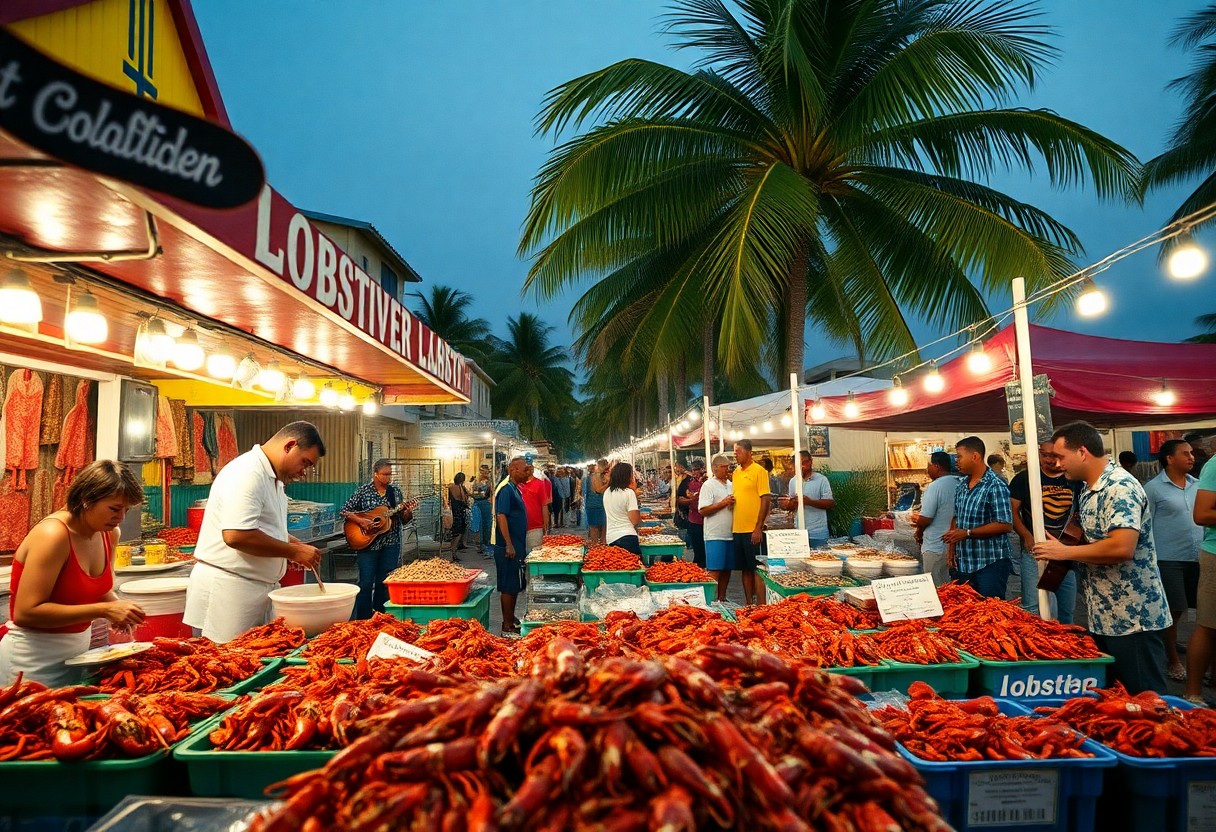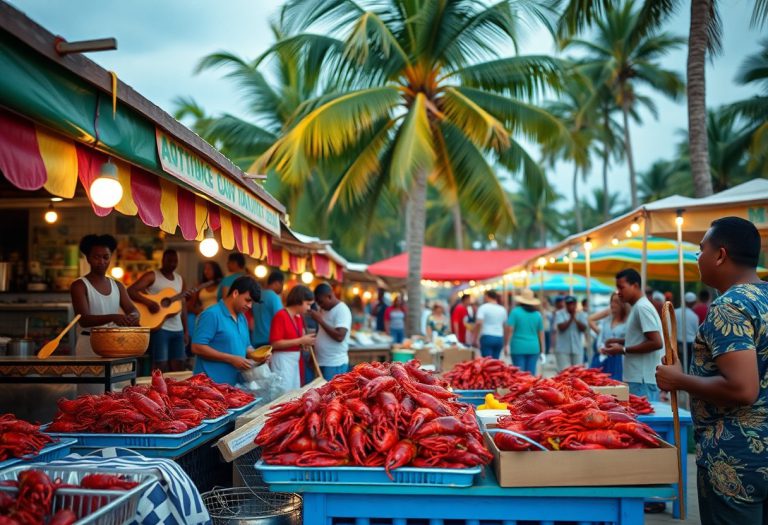Lobster festivals in Belize present a captivating fusion of cultural heritage and coastal celebrations. When you attend these vibrant festivals in Caye Caulker, San Pedro, or Placencia, you will immerse yourself in a rich tradition that has thrived for decades. Each festival highlights Sustainable fishing practices that play a crucial role in safeguarding Belize’s precious marine resources while simultaneously uplifting local communities. From age-old grilling techniques to modern culinary innovations, these festivals provide a unique opportunity to indulge in fresh, locally-caught spiny lobster, contributing to the economic vitality of coastal towns. Your involvement not only enhances your culinary experience but also aids in preserving the rich cultural legacy and the fragile marine ecosystem of Belize, ensuring that future generations can enjoy such vibrant traditions.
Immerse Yourself in the Exciting Atmosphere of Belize’s Lobster Festivals
The Belize lobster festivals are far more than mere celebrations; they embody a cultural festivity that marries seafood gastronomy with community traditions. These lively events radiate the warmth of Belizean hospitality while emphasizing the importance of sustainable fishing practices. With an impressive attendance of over 15,000 visitors annually across various locations, these festivals have become an essential part of Belize’s cultural calendar, drawing both locals and tourists who appreciate the unique culinary offerings and the vibrant community spirit. By attending, you not only enjoy mouthwatering dishes but also participate in a celebration that fosters community bonds and highlights the significance of preserving Belize’s rich maritime heritage.
Explore Unique Festival Experiences Across Beautiful Belize
- Caye Caulker Lobster Fest – A lively celebration in July featuring local flavors, live music, and colorful parades that showcase traditional Belizean culture.
- San Pedro Lobster Festival – A two-week culinary extravaganza showcasing the best of Belizean seafood, culinary competitions, and unforgettable entertainment.
- Placencia Lobster Fest – A festive beachside gathering filled with music, dance, and delicious food that highlights the coastal community’s vibrant lifestyle.
| Festival Location | Unique Features |
|---|---|
| Caye Caulker | Engaging traditional cooking demonstrations that highlight local culinary skills and the vibrant community. |
| San Pedro | Exciting lobster crawl events where participants can sample various dishes from local restaurants and vendors. |
| Placencia | Festive beach parties with live music, local artisans, and a lively atmosphere that captivates all attendees. |
| Duration | 2 to 14 days of festivities filled with food, fun, and culture, offering something for everyone. |
| Peak Season | July to August is the ideal time for lobster lovers to indulge in the flavors and festivities. |
Discover the Rich History Behind Belize’s Lobster Festival Tradition
The inception of the Belize lobster festivals marks a significant milestone in the nation’s cultural calendar. It began in 1994 with the inaugural Caye Caulker Lobster Festival, which was originally a modest fundraising initiative. This event aimed to bring the community together while promoting the local lobster industry, and it quickly gained popularity as a celebration of Belize’s rich culinary heritage. As the community embraced this initiative, the festival evolved into a vibrant spectacle that showcases local talent and fosters unity.
Over the years, Belize’s lobster festivals have transformed from humble community gatherings into major tourism attractions. Today’s celebrations feature thrilling food competitions, lively beach parties, and enlightening sustainable fishing demonstrations. This evolution has firmly established these festivals as vital to both the local economy and the rich cultural identity of Belize, showcasing the resilience and creativity of its people while drawing attention to the importance of marine conservation.

Understanding the Vital Role of Sustainable Fishing Practices in Belize
Your appreciation for Belize’s lobster industry will deepen as you discover their unwavering commitment to sustainable fishing. Local fishing communities strive to balance the demands of the festivals with the need to protect vital marine resources. Local fishers adhere to strict size and weight requirements, ensuring that only mature lobsters are harvested. This includes a minimum tail weight of 4 ounces and a carapace length of 3 inches, which are essential for the sustainability of the lobster population. By following these guidelines, the fishing community not only ensures its own livelihood but also supports the ecological balance necessary for future lobster harvests.
Comprehending Fishing Regulations and Guidelines for a Sustainable Future
The fishing practices in Belize are governed by clear seasonal restrictions that help ensure the health of lobster populations. The fishing season extends from July 1 to February 28, allowing lobsters to reproduce during the off-season. The Belize Fisheries Department plays a crucial role in enforcing these regulations through regular monitoring and imposing heavy penalties for violations. By participating in these festivals, you are actively supporting vital conservation efforts that contribute to the overall health of the marine ecosystem and the longevity of the lobster industry.
Delving into Traditional Fishing Techniques That Promote Marine Life Preservation
As you delve into Belize’s rich fishing heritage, you’ll learn that local fishers utilize three primary techniques: lobster traps, diving with hooks, and lobster shades. These methods have been meticulously refined over generations to mitigate environmental impact while ensuring effective harvest rates. Each technique demonstrates a deep respect for nature and the need for sustainability in fishing practices, highlighting the importance of responsible fishing methods.
For example, lobster shades – sustainable artificial shelters – offer safe havens for lobsters, enhancing harvesting efficiency while protecting young lobsters. These structures can remain submerged for 2-3 years, unlike traditional traps which must be removed during the closed season. Understanding these methods fosters greater appreciation for the preservation of both fishing culture and marine ecosystems, showcasing the innovative approaches taken by local fishers to maintain balance in their environment and ensure long-term sustainability.

Crafting a Winning Strategy for an Unforgettable Lobster Festival Experience
While the thrill of organizing a lobster festival is palpable, having a well-structured plan is essential for ensuring its success. A successful festival requires careful consideration of various factors, including logistics, vendor coordination, and safety measures. Your planning efforts will lay the groundwork for a memorable event that delights attendees and encourages community engagement.
- Choosing an appropriate venue that can accommodate the expected crowd size is crucial for a successful event, allowing for smooth movement and enjoyment.
- Permits and licenses should be processed in advance to avoid delays and potential legal issues that could hinder festival operations.
- Coordinating with local vendors requires meticulous planning and communication to ensure everyone is on the same page and prepared for the festivities.
- Implementing safety measures that adhere to health regulations is imperative for the well-being of attendees and the overall success of the event.
It’s advisable to allocate at least 3-4 months for thorough preparation to ensure a smooth event, allowing for ample time to address any unexpected challenges that may arise and to create an enjoyable atmosphere for all participants.
Critical Elements for Effective Festival Planning and Execution
Successfully planning your festival means paying attention to specific details to create a seamless experience for attendees. Considerations such as weather, crowd management, and vendor coordination are essential for a well-executed event that attracts visitors and keeps them engaged throughout the celebration.
- Weather considerations during the July-August season can impact turnout, so contingency plans are important to manage any weather-related challenges.
- Availability of an emergency response team is essential for safety and quick action in case of incidents, ensuring the well-being of all participants.
- Implementing waste management systems to maintain cleanliness and reduce environmental impact is vital for preserving the festival site and promoting sustainability.
- Crowd control measures should be in place to ensure attendee safety and a positive experience, allowing everyone to enjoy the festivities comfortably.
Once these elements are secured, you can shift your focus to scheduling entertainment and activities that will engage and delight festival-goers, making the event a memorable occasion for all involved.
Ensuring Culinary Excellence and Safety Standards at Your Festival
To guarantee food quality at your festival, maintaining proper storage temperatures for lobster is essential to prevent spoilage and ensure safe consumption. Vendors must possess food handling certifications and strictly adhere to local health guidelines to ensure the safety of the food served during the event. It is vital to uphold the highest standards to protect public health and foster an enjoyable festival atmosphere.
Moreover, it is crucial to establish food safety standards throughout the event. Establishing clear guidelines for portion control and cooking methods is vital to ensure consistency and quality across all vendor offerings. Vendors need to keep track of their lobster sourcing to comply with Belize’s fishing regulations, which specify a minimum tail weight of 4 ounces. This attention to detail not only enhances the festival experience but also supports the community’s commitment to sustainability and responsible culinary practices.
Fostering Economic Growth Through Engaging Lobster Festivals
Numerous coastal communities in Belize have experienced significant economic growth thanks to lobster festivals. These events generate over $2 million annually in tourism revenue, fostering job creation and bolstering local businesses. Your participation in these festivals directly contributes to the sustainable fishing industry and aids in the preservation of traditional fishing practices, ensuring that local economies thrive while respecting natural resources and promoting a healthy ecosystem.
Transformative Economic Benefits for Local Communities and Economies
Even the smallest fishing villages have transformed into thriving tourist destinations during festival seasons. You’ll encounter local families managing food stalls, craft vendors offering unique souvenirs, and fishermen proudly showcasing their fresh catch. The festivals create direct income opportunities for over 500 local families while supporting important marine conservation initiatives. This influx of visitors not only boosts the economy but also fosters a sense of community pride and cultural exchange, enriching both locals and tourists alike.
Key Factors Driving the Growth of the Lobster Festival Industry
An insightful analysis of Belize’s lobster festival industry reveals several pivotal growth drivers that contribute to its ongoing success:
- Sustainable fishing practices that protect marine life and ensure long-term viability, fostering a healthy ecosystem.
- International tourism promotion that attracts visitors from around the world, enhancing the cultural exchange.
- Local culinary innovation that enriches the festival experience and showcases Belizean flavors, making it an unforgettable culinary journey.
- Community participation that fosters inclusivity and celebrates local culture, creating a sense of belonging.
This collective impact has resulted in a remarkable 15% annual growth in festival attendance, showcasing the importance of these events to both the local economy and cultural identity. The success of these festivals hinges on a collaborative approach that prioritizes sustainability and community engagement.
It’s essential to recognize that the success of these festivals hinges on:
- Strict adherence to fishing regulations that ensure sustainability and protect marine resources, ensuring a balance between profit and conservation.
- Quality control measures that maintain high standards for food and safety, protecting both vendors and attendees.
- Environmental protection initiatives that safeguard ecosystems for future generations, promoting a culture of conservation.
- Robust tourism infrastructure that enhances visitor experiences and fosters economic growth, making the festivals accessible and enjoyable for all.
This sustainable approach promises long-term economic benefits for local communities and the environment, creating a harmonious balance between tourism and conservation, ensuring that future generations can continue to enjoy these vibrant celebrations.
Dedication to Conservation Efforts: Protecting Belize’s Marine Resources
The protection of Belize’s spiny lobster population is paramount, leading to the implementation of strict fishing regulations and seasonal restrictions. These proactive measures have successfully maintained healthy lobster populations while supporting local fishing communities. The closed season from March 1 to June 30 is critical for successful breeding and population recovery, ensuring that the lobster population remains stable for years to come and that local fisheries can sustain their livelihoods.
Proactive Environmental Protection Measures for a Sustainable Future
Even small actions can lead to significant impacts in lobster conservation. Local fishers employ sustainable fishing methods such as lobster shades and regulated traps to minimize their environmental footprint. The minimum catch size of 4 ounces and 3-inch carapace length ensures that young lobsters have the opportunity to grow and reproduce before being harvested, fostering a healthy marine ecosystem that benefits both the environment and the fishing community.
Empowering Community Education Initiatives for Future Generations
Your interest in local conservation efforts will be rewarded as you learn how Belize’s fishing communities impart traditional sustainable fishing practices to younger generations. Local organizations frequently host workshops focused on responsible fishing methods and emphasize the importance of adhering to regulations. This education ensures that the next generation of fishers understands the significance of sustainability in preserving marine life and supporting local economies.
Furthermore, your participation in these festivals directly supports educational initiatives. The festivals serve as interactive platforms where you can engage with local fishers and learn about marine conservation. These events help fund educational programs that teach both children and visitors about the significance of sustainable fishing practices, fostering a culture of stewardship and encouraging responsible behaviors that help protect the marine environment.

Maximizing Your Enjoyment at the Lobster Festivals: Expert Tips and Insights
Once you decide to attend a Belize Lobster Festival, it’s vital to familiarize yourself with the safety guidelines and local regulations. Following these best practices will enhance your festival experience while promoting sustainability and ensuring the safety of all attendees during the celebrations. Being informed allows you to fully enjoy the festivities while respecting the local community and environment, contributing to a positive experience for everyone.
Essential Vendor Guidelines for Success in Festival Participation
If you’re considering selling your goods at the festival, it is imperative to acquire proper permits from local authorities to ensure legal compliance. Your booth must comply with food safety standards, sourcing lobsters exclusively from licensed fishermen. Verification of all lobsters meeting the minimum size requirement of 4 ounces and 3 inches carapace length is mandatory to ensure compliance with local regulations and promote responsible seafood sourcing.
Visitor Tips for an Enjoyable and Safe Festival Experience
When attending the festival, it’s advisable to arrive early to savor the best selection of lobster dishes and avoid large crowds. Your overall experience will be enhanced by bringing cash for easy transactions, wearing comfortable shoes for walking, and utilizing sun protection to enjoy the outdoor festivities. Prior to making purchases, be sure to check the food preparation standards and the quality of the offerings to ensure a satisfying culinary experience.
Engaging in festival activities requires attentiveness to safety protocols. You can enrich your experience by sampling various vendor offerings, participating in local dance celebrations, and endorsing sustainable fishing practices. Festivals typically run from morning until late evening, with peak crowds occurring between 12 PM and 4 PM, so plan your visit accordingly to make the most of your time and enjoy all the festivities.
Embrace the Spirit of Belize’s Lobster Festivals
Through your exploration of Belize Lobster Festivals, you can appreciate how these events intertwine cultural celebration with sustainable practices. Visiting any of these festivals – whether in Caye Caulker, San Pedro, or Placencia – offers you a chance to indulge in the authentic flavors of Belize while supporting local communities. Witness firsthand how fishers adhere to stringent guidelines for lobster conservation, chefs craft exquisite dishes, and locals share their rich heritage. These festivals demonstrate Belize’s commitment to balancing tourism growth with environmental stewardship, establishing them as a model for sustainable food festivals worldwide and enriching your travel experience.
Your Questions Answered: Frequently Asked Questions About Lobster Festivals in Belize
Q: When and where can I attend the Lobster Festivals in Belize?
A: The Lobster Festivals commence at the start of lobster season on July 1st. The primary locations for these festivities are Caye Caulker (since 1994), Placencia (since 1998), and San Pedro (since 2007). The San Pedro festival spans two weeks, while Caye Caulker and Placencia host weekend-long celebrations, each offering unique experiences and flavors that highlight the region’s rich culinary heritage.
Q: What measures does Belize take to ensure sustainable lobster fishing practices during the festivals?
A: The Belize Fisheries Department enforces rigorous regulations: lobsters must weigh a minimum of 4 ounces and have a carapace length of at least 3 inches. The fishing season lasts from July 1 to February 28. Fishers employ sustainable methods such as lobster shades and traps, which must be removed during the closed season to protect the lobster population. Licensed fishers adhere to these regulations to ensure the sustainability of the industry and preserve marine biodiversity.
Q: How do the Lobster Festivals economically benefit local communities?
A: The festivals create significant income opportunities for local fishers, restaurant owners, and businesses during the tourism low season. Restaurants participate in events like the lobster crawl, showcasing special lobster dishes that draw crowds and enhance local cuisine. Attracting thousands of visitors, these festivals bolster the local economy through food sales, accommodations, and tourism activities. The events provide fishing families with a reliable source of income while supporting sustainable fishing practices that benefit the environment and promote community resilience.
The Article Belize Lobster Festivals: A Celebration of History, Sustainability, and Prosperity appeared first on Belize Travel Guide
The Article Belize Lobster Festivals: Celebrating Sustainability and Culture Was Found On https://limitsofstrategy.com
References:
Belize Lobster Festivals: Celebrating Sustainability and Culture





I love the way you highlighted the blend of cultural heritage and sustainability in Belize’s lobster festivals. Having visited Caye Caulker during one of these celebrations, I was struck not only by the delicious food but also by the palpable pride the local community has in their traditions and practices. It’s fascinating how these events promote sustainable fishing and showcase local culinary talents, ensuring that the marine ecosystem remains healthy for future generations.
It sounds like you had an incredible experience during Belize’s lobster festivals. The way cultural heritage and sustainability intertwine in events like those really highlights how communities can celebrate their traditions while being mindful of the environment.
You make a solid point about the blend of cultural heritage and sustainability at Belize’s lobster festivals. It’s fascinating how these events can serve as a platform for not just preserving traditions, but also pushing for sustainable practices in the face of environmental pressures. However, it raises a deeper question: are these celebrations genuinely sustainable, or do they often gloss over harsher realities, like overfishing or environmental degradation?
You’ve hit on something really important there. The lobster festivals in Belize are more than just a fun way to enjoy delicious seafood; they serve as a fantastic example of how traditions can be celebrated while also respecting the local environment. It’s fascinating to see how communities come together to honor their culinary heritage while keeping sustainability front and center in their planning.
You’ve really captured the essence of those lobster festivals—it’s like a celebration where every claw and tail carries a story. It’s amazing how everyone pitches in to create what feels like a giant family reunion, minus the awkward karaoke moments.
You raise some excellent points about the lobster festivals in Belize. It’s true that these events do a great job of blending celebration with environmental consciousness. However, I find myself wondering how well this balance is maintained over the years. While the festivals highlight the cultural importance of lobster and the community spirit, there’s always the risk of over-commercialization overshadowing the sustainability efforts that are so crucial.
You’ve captured the essence perfectly. The lobster festivals not only bring people together to celebrate culinary traditions, but they also remind us that we can appreciate our resources responsibly. It’s fascinating to witness locals share their stories and techniques while looking out for the delicate balance of their marine environment.
You’ve really captured the essence of the lobster festivals in Belize—it’s a wonderful blend of community, culture, and conscious living. The way local communities pull together not only to celebrate their culinary traditions but also to honor the environment is so inspiring. It makes you think about how festivals in other parts of the world could adopt similar practices.
You’ve really captured the essence of those festivals. It’s heartwarming to see a community take pride in its culinary heritage while making conscious choices for the environment. I’ve often thought about how food traditions can be a bridge to sustainability, not just in Belize but globally.
I recently came across an insightful piece that explores how Belize and Panama compare as retirement and investment destinations, which really highlights the balance between cultural heritage and sustainable living in these beautiful locales.
‘Belize vs. Panama: Best Retirement and Investment Destination’
https://cardetailersbrisbane.com.au/belize-vs-panama-best-retirement-and-investment-destination/.
It’s great to hear your thoughts on the lobster festivals! What stood out to me was how these events serve as a bridge between tradition and modern environmental consciousness. The local fishermen, for example, share stories that connect generations, while also emphasizing sustainable practices that protect the reefs. It’s fascinating to see how the community embraces eco-friendly methods alongside their vibrant cultural heritage.
I completely relate to what you’re saying about the lobster festivals acting as that bridge between tradition and modern environmental consciousness. It’s really inspiring to see how local fishermen not only uphold their family’s heritage through these events but also actively engage with sustainable practices. It reminds me of how important it is for communities to share these stories—they’re not just about the catch; they’re about the people, the history, and the responsibility we have to the environment.
You’re hitting the nail on the head with that observation about lobster festivals. It’s pretty remarkable how these events can serve as not just a celebration but as a platform for local fishermen to share their stories and practices. The way they blend tradition with a sharper focus on sustainability really speaks to a growing awareness of our environmental responsibilities.
You really hit the nail on the head with your thoughts about lobster festivals and their deeper significance. It’s fascinating to see how these gatherings blend the rich traditions of local fishermen with contemporary priorities like sustainability. Those festivals aren’t just about showcasing the catch; they serve as a vibrant tapestry of culture, community, and awareness.
I completely agree with your observations about the lobster festivals. They do beautifully highlight that intersection of tradition and modern values. The oral history shared by local fishermen is such a rich part of the experience; it really brings a sense of place and community that you don’t often find elsewhere.
You’ve touched on something really important. The lobster festivals in Belize are such a vibrant showcase of culture, and it’s heartening to see how they incorporate sustainability into their celebrations. You really experience the community spirit firsthand when you’re there—the locals not only share their delicious recipes but also introduce you to their fishing practices, which are rooted in respect for the ocean.
You bring up some fascinating points about the lobster festivals in Belize. They really do embody the spirit of the community and highlight the importance of sustainability. It’s refreshing to see cultural celebrations that don’t just focus on indulgence but also honor the environment and local traditions.
It’s great to hear you resonated with the vibrant culture of the lobster festivals in Belize. Those celebrations truly encapsulate the essence of community. The way locals welcome visitors with their recipes speaks volumes about their pride and connection to the sea.
I completely agree; the sense of community at the lobster festivals really is something special. It’s fascinating how these events not only celebrate local culinary traditions but also strengthen social bonds. I remember attending one and chatting with a fisherman who shared stories of his family’s fishing practices passed down through generations. It made me realize how important these festivals are in preserving not just recipes, but also the history and culture tied to the sea.
You really captured the essence of the lobster festivals in Belize. It’s amazing how these events serve as both a celebration of local culture and a platform for promoting sustainable practices. What stands out to me is the genuine pride the community takes in sharing not just their culinary traditions, but also their deep connection to the ocean.
It’s interesting how these festivals serve as a bridge between culture and sustainability. Experiencing the community spirit firsthand really changes your perspective, doesn’t it? When you see locals sharing their recipes and explaining their fishing practices, it feels like you’re not just a visitor but part of something much larger.
You bring up a key point about the connection between cultural heritage and sustainability at events like the lobster festivals in Belize. It does seem like a tightrope walk—celebrating a tradition while also being conscious of environmental impacts. It’s fascinating how these events can remind both locals and visitors of the importance of their marine resources. However, I can’t help but wonder how sustainable practices are enforced during these celebrations.
I really appreciate that observation about Belize’s lobster festivals. It’s fascinating how these celebrations are not just about the food but also about the community coming together to honor their traditions in a way that respects the environment. I remember chatting with local fishermen who emphasized their commitment to sustainable practices, like only catching lobster during certain months to allow populations to regenerate.
It’s great to hear you experienced the festival firsthand on Caye Caulker. That sense of pride you felt from the locals really stands out. Those moments where people share their traditions can create a strong connection—especially in a setting that focuses on sustainability.
It’s great to hear about your experience at the lobster festival in Caye Caulker! The atmosphere during these celebrations is truly unique, isn’t it? You can almost feel the community’s pride in every dish they serve and every story they share. It’s one thing to enjoy the delicious flavors, but witnessing how deeply intertwined these culinary traditions are with their identity is something special.
I’m glad you enjoyed the article and your visit to Caye Caulker sounds incredible. It’s amazing how these festivals bring the community together, isn’t it? The local pride you noticed really shines through, especially when families share traditional recipes. It’s great to see how they balance enjoying the bounty of the sea while being mindful of sustainability.
You’re spot on about the festivals bringing everyone together. It’s like the whole island comes alive with shared stories and laughter. I was particularly struck by how the older generations took time to explain their dishes to the younger ones, weaving a bond through recipes that have been handed down. It felt like a living tradition, not just a meal. And the commitment to sustainability really stood out; locals shared how they manage fishing practices to protect their waters for future generations. It’s heartening to see such care taken for both community and the environment. It’s a dynamic balance that many places could learn from.
Your observation about the connection between community and festivals is spot on. It’s refreshing to see how such gatherings bring people together, not just for celebration, but also to foster a deeper appreciation for their culture. At the heart of it all, these events become a canvas for local traditions, especially when families proudly share their recipes passed down through generations. Each dish tells a story and connects the past to the present, giving visitors a taste of authentic Caye Caulker life.
I’m glad you enjoyed the mix of culture and sustainability at the lobster festivals in Belize! Caye Caulker really brings that sense of community to life, doesn’t it? It’s amazing how these festivals not only allow locals to showcase their culinary skills but also reinforce the importance of sustainable fishing practices.
You’re spot on about the sense of community on Caye Caulker. It really does feel like everyone is involved in the lobster festivals, from the chefs to the fishermen, and even the visitors. What’s particularly interesting is how these events reflect a deep respect for the ocean and the resources it provides. Locals are not just showcasing their culinary skills; they are also sharing stories about the traditional fishing methods that have been passed down through generations.
Your insights into the lobster festivals in Belize beautifully capture the spirit of these vibrant celebrations. The blend of cultural heritage and modern sustainability practices is indeed a unique aspect that makes these festivals so special. I’ve had the pleasure of attending a lobster festival in San Pedro a couple of years ago, and it was remarkable to see how the community rallied around these events, showcasing not just culinary delights but also the rich stories tied to their fishing traditions.
It sounds like you had an incredible experience at the lobster festival in San Pedro. I’ve heard so many great things about that particular event, especially the way it brings the community together. The storytelling aspect really adds a deeper layer, don’t you think? It’s fascinating how these festivals not only celebrate the cuisine but also serve as a living archive of cultural traditions.
You’re totally right about the community vibe at the lobster festival in San Pedro. It’s something pretty special when everyone comes together like that, sharing stories and experiences. That personal storytelling aspect really does create a unique connection. You can hear the laughter, see the camaraderie, and it feels like a tapestry of lives interwoven by food and tradition.
It’s really true, isn’t it? That sense of connection at the lobster festival is unlike anything else. I find it fascinating how food acts as such a strong medium for stories and experiences. It can almost feel like the food itself carries the memories of those who prepare and share it, right?
You captured the essence of the San Pedro lobster festival beautifully. It’s remarkable how such events can transform a simple celebration of food into something much richer. The way storytelling intersects with the culinary experience is particularly interesting. Many of the local fishermen shared tales of their ancestors, detailing how they would catch lobster using techniques passed down through generations. By listening to these stories, you begin to see the festival as a tapestry woven from individual experiences and communal history.
It’s interesting how you’ve highlighted the community aspect of the lobster festival. It really does create a unique space where people from all walks of life come together, sharing not just food but also stories and traditions. When I was there, I noticed how vibrant the energy was—people chatting, laughing, and reminiscing about past festivals. It felt like a reunion of sorts, where shared experiences helped bridge gaps between generations.
It’s great to hear your thoughts on the lobster festival! That sense of community really is one of the most striking aspects of the event. Watching people come together—families, friends, and visitors—creates an atmosphere that’s hard to replicate elsewhere. The storytelling, as you mentioned, is such a unique element.
I really appreciate how you highlighted the storytelling aspect of the lobster festival. I found that to be one of the most compelling parts of the event. It’s interesting how these narratives, often passed down through generations, shape our understanding of not just the food, but the community itself.
I’m glad you connected with the storytelling aspect of the lobster festival. It’s fascinating how these tales, often woven into the fabric of our communities, create a rich tapestry of identity and belonging. When you attend the festival, you’re not just there for the lobsters or the food stalls; you’re part of something much larger—a narrative that stretches back through generations.
It’s great to hear that you had the chance to experience the lobster festival in San Pedro. Those gatherings are truly something special; they reflect the community’s pride in its cultural heritage while also highlighting contemporary efforts toward sustainability.
It’s great to hear you had such an enriching experience at the lobster festival in San Pedro. Those events really are a wonderful blend of food, community, and cultural heritage, and they offer a unique glimpse into the heart and soul of Belizean life.
I have to say, the enchanting prospect of attending a lobster festival in Belize feels like a blend of paradise and culinary adventure. Who wouldn’t want to taste fresh spiny lobster while soaking in the vibrant culture of the Caribbean? It seems like the perfect recipe for happiness—especially if you can avoid the lobster-induced food coma that inevitably sneaks up on you after a little too much indulging. I can already picture myself in front of an enormous grill, surrounded by delicious aromas, while trying to chat with locals who are expertly flipping lobster on the barbecue. Let’s just say my attempts at grilling might make for a more entertaining spectacle than anything culinary!
You paint a vivid picture of that lobster festival. It really is more than just food; it’s an experience that engages all the senses. I appreciate your thoughts on the balance between paradise and culinary adventure. The fresh spiny lobster is definitely a highlight, but the culture and atmosphere are just as important.
You captured the essence of that lobster festival perfectly. There’s something about the rhythm of the celebrations, the laughter, and the sounds of live music that makes those events feel alive. It reminds me of how food can be a vessel for culture, connecting us to places and people in a deeply personal way.
You really hit the nail on the head with that observation about food as a vessel for culture. It’s fascinating how something as simple as a lobster roll can spark conversations and connections among people who might otherwise never cross paths. At the festival, when you see a family sharing a meal or a group of friends gathered around a table, it’s like you can feel that shared experience create a little community, even if just for a day.
Your description paints such a vivid picture of the lobster festival experience. It’s a true blend of flavors and warmth, isn’t it? The contrast of the fresh ocean air and the rich, smoky scents from the grill creates an atmosphere that feels alive with culture.
It’s great to hear you share that excitement about a lobster festival in Belize. The combination of fresh spiny lobster and the thriving Caribbean culture is certainly a unique experience. One thing that impresses many visitors is how integral the ocean is to local life, and lobster fishing is often a family affair. When you’re chatting with locals, you might hear some fascinating stories about how traditional fishing methods have been passed down through generations.
You really captured the essence of the lobster festival and its connection to the local culture. There’s something special about seeing families come together for the catching and cooking of spiny lobster. It’s not just about the seafood; it’s about the stories, the traditions, and the love that goes into those dishes.
I couldn’t agree more with your take on the lobster festival! It’s a special time of year where the community really comes alive. There’s something magical about seeing families come together to catch lobsters—the laughter, the banter, and those lively tales from days gone by.
It sounds like an incredible experience, doesn’t it? The blend of fresh seafood, local culture, and stunning scenery in Belize really does create a sense of paradise. The idea of gathering around a grill, soaking up the sun, and savoring fresh spiny lobster while interacting with locals sounds like pure bliss. It’s interesting how food has this amazing ability to connect us and tell stories about a place and its people.
It really does paint a beautiful picture, doesn’t it? The way food weaves its way into experiences and connects us to the heart of a culture is something I find so fascinating. There’s something so comforting about gathering around a grill with friends and locals; it transforms a meal into a shared celebration.
It really does sound like a slice of paradise, doesn’t it? There’s something so special about sharing a meal with local communities, especially when it’s centered around fresh ingredients like spiny lobster. It’s fascinating how food can serve as a bridge between cultures, isn’t it? I remember a similar experience in a small coastal town, where the locals not only shared their catch of the day but also their stories, blending personal history with culinary traditions.
You’ve captured the essence of the lobster festival beautifully. The blend of fresh spiny lobster and the warm Caribbean vibes really can feel like a dream come to life. There’s something special about the energy of these local gatherings, where everyone seems to come together to celebrate the bounty of the sea.
These lobster festivals sound like such a fantastic way to not only enjoy delicious food but also to connect with the local culture and community. I love the emphasis on sustainable fishing practices—it’s so important that we support methods that protect our oceans while enjoying these culinary treasures.
I couldn’t agree more with you about the lobster festivals! They really do offer such a unique blend of food and culture. It’s fascinating to see how these events not only celebrate the local cuisine but also foster a sense of community among residents and visitors alike.